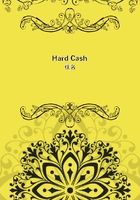
第96章
SKINNER--called "young" because he had once had a father on the premises--was the mole-catcher. The feelings with which he had now for some months watched his master grubbing were curiously mingled. There was the grim sense of superiority every successful detective feels as he sees the watched one working away unconscious of the eye that is on him; but this was more than balanced by a long habit of obsequious reverence. When A. has been looking up to B. for thirty years, he cannot look down on him all of a sudden, merely because he catches him falsifying accounts. Why, Man is a cooking animal: bankrupt Man especially.
And then Richard Hardie overpowered Skinner's senses: he was Dignity in person: he was six feet two, and always wore a black surtout buttoned high, and a hat with a brim a little broader than his neighbours', yet not broad enough to be eccentric or slang. He moved down the street touching his hat--while other hats were lifted high to him--a walking volume of cash. And when he took off this ebon crown and sat in the bank parlour, he gained in appearance more than he lost; for then his whole head was seen, long, calm, majestic: that senatorial front and furrowed face overawed all comers. Even the little sharp-faced clerk would stand and peep at it, utterly puzzled between what he knew and what he eyed:
nor could he look at that head and face without excusing them. What a lot of money they must have sunk before they came down to fabricating a balance-sheet!
And by-and-bye custom somewhat blunted his sense of the dishonesty, and he began to criticise the thing arithmetically instead of morally. That view once admitted, he was charmed with the ability and subtlety of his dignified sharper; and so the mole-catcher began gradually, but effectually, to be corrupted by the mole. He who watches a dishonest process and does not stop it, is half way towards conniving: who connives, is half way towards abetting.
The next thing was, Skinner felt mortified at his master not trusting him. Did he think old Bob Skinner's son would blow on Hardie after all these years?
This rankled a little, and set him to console himself by admiring his own cleverness in penetrating this great distrustful man. Now of all sentiments, Vanity is the most restless and the surest to peep out.
Skinner was no sooner inflated than his demure obsequious manner underwent a certain change: slight and occasional only; but Hardie was a subtle man, and the perilous path he was treading made him wonderfully watchful, suspicious, and sagacious. He said to himself, "What has come to Skinner? I must know." So he quietly watched his watcher; and soon satisfied himself he suspected something amiss. From that hour Skinner was a doomed clerk.
It was two o'clock: Hardie had just arrived, and sat in the parlour, Cato-like, and cooking.
Skinner was in high spirits: it was owing to his presence of mind the bank had not been broken some hours ago by Maxley. So now, while concluding his work, he was enjoying by anticipation his employer's gratitude. "He can't hold aloof after this," said Skinner; "he must honour me with his confidence. And I will deserve it. I do deserve it."A grave, calm, passionless voice invited him into the parlour.
He descended from his desk and went in, swelling with demure complacency.
He found Mr. Hardie seated garbling his accounts with surpassing dignity.
The great man handed him an envelope, and cooked majestic on. A wave of that imperial hand, and Skinner had mingled with the past.
For know that the envelope contained three things: a cheque for a month's wages; a character; and a dismissal, very polite and equally peremptory.
Skinner stood paralysed: the complacency died out of his face, and rueful wonder came instead. It was some time before he could utter a word: at last he faltered, "Turn me away, sir? turn away Noah Skinner? Your father would never have said such a word to _my_ father." Skinner uttered this his first remonstrance in a voice trembling with awe, but gathered courage when he found he had done it, yet lived.
Mr. Hardie evaded his expostulation by a very simple means: he made no reply, but continued his work, dignified as Brutus, inexorable as Fate, cool as Cucumber.
Skinner's anger began to rise, he watched Mr. Hardie in silence, and said to himself, "Curse you! you were born without a heart!"He waited, however, for some sign of relenting, and, hoping for it the water came into his own eyes. But Hardie was impassive as ice.
Then the little clerk, mortified to the core as well as wounded, ground his teeth and drew a little nearer to this incarnate Arithmetic, and said with an excess of obsequiousness, "Will you condescend to give me a reason for turning me away all in a moment after five-and-thirty years'
faithful services?"
"Men of business do not deal in reasons," was the cool reply: "it is enough for you that I give you an excellent character, and that we part good friends.""That we do not," replied Skinner sharply: "if we stay together we are friends; but we part enemies, if we do part.""As you please, Mr. Skinner. I will detain you no longer."And Mr. Hardie waved him away so grandly that he started and almost ran to the door. When he felt the handle, it acted like a prop to his heart.
He stood firm, and rage supplied the place of steady courage. He clung to the door, and whispered at his master--such a whisper: so loud, so cutting, so full of meaning and malice; it was like a serpent hissing at a man.